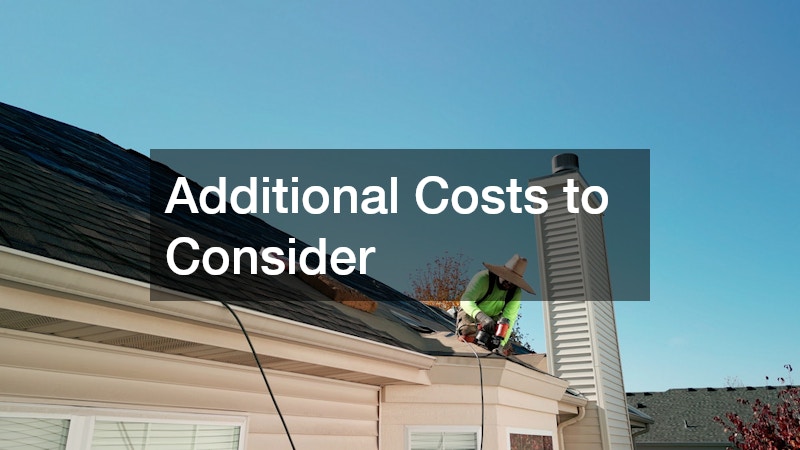Roof inspections play a crucial role in maintaining the structural integrity and longevity of a home. These assessments, conducted by local roofing contractors, help identify potential issues before they escalate into costly repairs. Homeowners should prioritize regular roof inspections to safeguard their investments and ensure the safety of their homes.
What Does a Roof Inspection Involve?
Visual Inspection
A roof inspection typically begins with a comprehensive visual examination. The inspector will look for signs of visible damage, such as cracked or missing shingles, which could lead to leaks. Additionally, the presence of debris and organic growth like moss and algae should be monitored as they can deteriorate the roof over time.
The purpose of the visual inspection is to assess the overall condition and cleanliness of the roof surface. Local experts are attentive to areas where leaves and branches may accumulate, potentially causing blockages or water pooling. Moss and algae, while seemingly harmless, can retain moisture and should be addressed promptly.
This stage of the inspection provides a preliminary overview of the roof’s condition, aiding in identifying areas that may require closer scrutiny. Without regular inspections, small issues may go unnoticed, allowing larger problems to develop unnoticed. Therefore, maintaining a schedule for visual inspections can significantly extend the roof’s lifespan.
Structural Assessment
Beyond the surface, a thorough roof inspection involves evaluating the roof’s structural integrity. Inspectors check for signs of sagging, which could indicate structural weaknesses that might need immediate attention. The stability of related components, including the chimney and gutter systems, is also examined to ensure safety and security.
In the structural assessment, inspectors ensure that all parts are securely fastened and functioning as they should. This includes checking for any signs of wear or damage in the materials that support the roof’s structure. It’s essential to address issues in the gutters and chimney, as these can contribute to larger structural problems if left unresolved.
The structural assessment helps homeowners understand the current state of their roof and any potential problems that could arise. A stable roof not only provides protection but also adds to the property value and curb appeal. Making informed decisions based on expert assessments can prevent costly repairs down the road.
How Long Does a Roof Inspection Typically Take?
Duration of Standard Inspections
The time commitment for a standard roof inspection usually varies depending on several factors. On average, a typical residential roof inspection might take between one to two hours. However, elements such as roof size, complexity, and type can influence this duration significantly.
Smaller, straightforward roofs may be inspected in under an hour, while larger, more complex structures require additional time. These inspections are meticulous, as they need to cover every aspect of the roof’s condition. Homeowners should allocate enough time for inspectors to conduct a thorough assessment, ensuring they catch any potential issues.
Engaging a local expert familiar with the roofing styles and common issues in the area can expedite the process. Such professionals bring specific insights that can streamline the inspection, providing more accurate and actionable conclusions. Moreover, a timely inspection helps uncover critical issues that, if left unchecked, could lead to expensive repairs.
Factors Affecting Inspection Time
Several factors can impact the length of a roof inspection, from weather conditions to roof accessibility. Inclement weather can delay inspections, making it challenging for inspectors to safely and effectively evaluate the roof. Additionally, roofs with limited access or complicated designs may require more time to assess thoroughly.
Another considerable factor is the extent of any issues identified during the inspection. If problems are discovered, inspectors may spend extra time diagnosing the severity and potential solutions, which can prolong the inspection. Communication between the homeowner and the inspector is key to understanding these timing variances.
Being aware of these factors ensures homeowners can allocate appropriate time and resources when planning a roof inspection. Taking these into account helps prevent unrealistic expectations and ensures the process is as smooth as possible. Accurate, detailed inspections facilitate better repair and maintenance plans, upstreaming potential long-term benefits.
Costs Associated with a Roof Inspection
Standard Costs and Pricing Models
The costs associated with a roof inspection can vary depending on several pricing models commonly used in the industry. Some inspectors charge a flat rate for standard inspections, which typically ranges from $150 to $400. Meanwhile, others may bill hourly, especially for more complex or larger roof structures that require additional time.
It’s important for homeowners to inquire about the pricing models during the initial consultation. Understanding whether the fee covers a comprehensive assessment or if additional charges apply for certain services is crucial. Obtaining quotes from multiple local experts can ensure that homeowners get a competitive price for quality service.
Additional Costs to Consider
Beyond the standard inspection fees, homeowners should be aware of potential additional expenses. These can include immediate repair costs for issues identified during the inspection, which are necessary to prevent further damage. Moreover, further diagnostic tests, such as thermal imaging to detect leaks, may incur extra charges.
Unanticipated discoveries during an inspection could lead to recommendations for more extensive work, such as re-roofing or structural reinforcement, contributing to higher costs. It’s beneficial to set aside a contingency budget to cover these unexpected costs, thus avoiding financial strain when critical repairs are necessary.
Roof inspections by local experts are essential for maintaining a safe and functional home environment. Regular check-ups can prevent minor issues from escalating into major repairs, saving homeowners money and headaches in the future. Encouraging timely and detailed inspections not only upholds roof health but also prolongs the life and value of the property.




